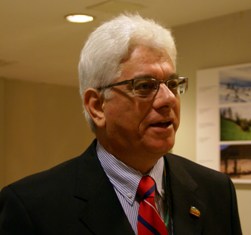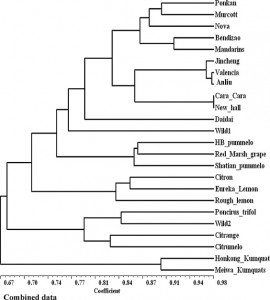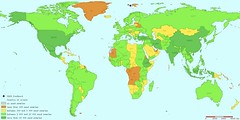…by country of origin, on its third birthday.
News on the Desert Research Center genebank
 Ismail Abdel Galil (left), founder of the looted Egyptian Deserts Gene Bank, has told SciDev.net that he is hopeful that the EDGB will be able to recover some of the genebank’s material that was duplicated at the Millennium Seed Bank at Kew. Galil confirmed that most of the material was not duplicated, not even at the National Gene Bank in Giza, which was not looted.
Ismail Abdel Galil (left), founder of the looted Egyptian Deserts Gene Bank, has told SciDev.net that he is hopeful that the EDGB will be able to recover some of the genebank’s material that was duplicated at the Millennium Seed Bank at Kew. Galil confirmed that most of the material was not duplicated, not even at the National Gene Bank in Giza, which was not looted.
SciDev.net’s report, more than three weeks after the news broke, here, adds some information to sketchy details we had before. The looting of the Desert Research Center in Cairo was carried out by “mobs,” while “Bedouin groups in the Sinai region, angered by the Mubarak government’s policies towards them, went on the rampage” and attacked the EGDB. According to Hazem Badr, SciDev.net’s reporter,
DRC chairman Ibrahim M. Nasr … estimated the losses at the facilities in Cairo and North Sinai at around US$1.3 million. That figure does not include the desert plant gene bank, some of which has been irretrievably lost.
Galil, who founded the desert genebank in 1996, had been honoured by Bioversity International as one of the Guardians of Diversity in the Mediterranean at a celebration in Rome in May 2009. 1 Unfortunately the genebank’s “efficient operations and state of the art technology,” cited in the award, were no match for looters.
Nibbles: Lingonberries, Genebank Standards, Genebank, Seed Systems, Chinese drought, Cuba, Mexican bees
- Lingonberries power a trip from moose to mousse, and mush.
- FAO has a draft of updated genebank standards!
- Climate change person visits ICRISAT genebank, is impressed.
- Access to improved seed lauded.
- Yo! Price spike watchers! The Chinese drought thing is complex. Pay yer money. Take yer choice.
- Our friends at DAPA highlight their friends in Cuba: “peasant farmers have been able to boost food production via environmentally friendly methods”.
- Protecting native bee populations in Mexico.
Botanic gardens get the treatment
We probably don’t give botanic gardens the attention they deserve. So it’s a pleasure to point out that Biodiversity and Conservation has a special issue out on Botanic Gardens in the Age of Climate Change, with a focus on Europe. Lots of interesting stuff in there, including from some old friends.
 And since we’re on the subject of published papers, I’d like to say what a good idea it is to include an illustration in the abstract of a paper. I had not come across this before I stumbled on the example here on the left in a recent Scientia Horticulturae paper on Citrus phylogeny.
And since we’re on the subject of published papers, I’d like to say what a good idea it is to include an illustration in the abstract of a paper. I had not come across this before I stumbled on the example here on the left in a recent Scientia Horticulturae paper on Citrus phylogeny.
The way things were
Mr El-Sayed Mohamed El-Azazi, Executive Director of the Egyptian Deserts Gene Bank, has posted a comment to one of our previous posts about the looting of his genebank. It includes a link the following presentation on what the place looked like before the fateful day. The call has gone out for help replacing lost equipment. One can only hope it will be heeded.
